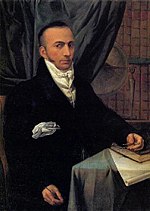Niccolò Cacciatore, Date of Birth, Place of Birth, Date of Death
TweetNiccolò Cacciatore
Italian astronomer
 Date of Birth: 26-Jan-1770
Date of Birth: 26-Jan-1770
 Place of Birth: Casteltermini, Sicily, Italy
Place of Birth: Casteltermini, Sicily, Italy
Date of Death: 28-Jan-1841
Profession: astronomer
Zodiac Sign: Aquarius 
About Niccolò Cacciatore
- Niccolò Cacciatore (Italian: [nikko'l? kkatt?a'to?re]; 26 January 1770 – 28 January 1841) was an Italian astronomer.Cacciatore was born at Casteltermini, in Sicily.
- While studying mathematics and physics in Palermo, he became acquainted with Giuseppe Piazzi, head of the Palermo Astronomical Observatory, and became a graduate student assistant at the observatory in 1798.
- Two years later, in 1800, the year before Piazzi discovered Ceres, Cacciatore was formally put on staff.Cacciatore helped Piazzi compile the second edition of the Palermo Star Catalogue (1814).
- He did the bulk of the work, in fact heading the project starting in 1807.
- He also published works on the comets of 1807 and 1819.Cacciatore succeeded Piazzi as director of the Palermo Observatory in 1817.
- As such, his most notable observation was the discovery of globular cluster NGC 6541 on 19 March 1826.
- The observatory was attacked, and he was imprisoned, during the Sicilian Revolution of 1820, but he survived to restore the facility and lead it for two more decades.In addition to astronomy, he was an expert on meteorology, and wrote a number of books on the subject.
- Further, after the political troubles of 1820, he served as a member of the legislature of the Kingdom of the Two Sicilies.
- Cacciatore was elected a Foreign Honorary Member of the American Academy of Arts and Sciences in 1837.He married Emmanuela Martini in 1812, with whom he had five children.
- His son, Gaetano, succeeded him as director of the observatory.
Read more at Wikipedia

